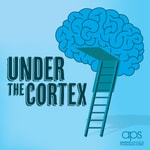Under the Cortex – Détails, épisodes et analyse
Détails du podcast
Informations techniques et générales issues du flux RSS du podcast.

Under the Cortex
psychologicalscience
Fréquence : 1 épisode/13j. Total Éps: 100

Classements récents
Dernières positions dans les classements Apple Podcasts et Spotify.
Apple Podcasts
🇺🇸 États-Unis - socialSciences
05/08/2025#84🇺🇸 États-Unis - socialSciences
04/08/2025#62🇺🇸 États-Unis - socialSciences
02/08/2025#73🇬🇧 Grande Bretagne - socialSciences
14/07/2025#82🇬🇧 Grande Bretagne - socialSciences
13/07/2025#57🇺🇸 États-Unis - socialSciences
13/07/2025#100🇬🇧 Grande Bretagne - socialSciences
12/07/2025#39🇬🇧 Grande Bretagne - socialSciences
10/07/2025#75🇨🇦 Canada - socialSciences
09/07/2025#91🇬🇧 Grande Bretagne - socialSciences
09/07/2025#46
Spotify
Aucun classement récent disponible
Liens partagés entre épisodes et podcasts
Liens présents dans les descriptions d'épisodes et autres podcasts les utilisant également.
See allQualité et score du flux RSS
Évaluation technique de la qualité et de la structure du flux RSS.
See allScore global : 53%
Historique des publications
Répartition mensuelle des publications d'épisodes au fil des années.
The Integrity of Psychological Research: Uncovering Statistical Reporting Inconsistencies
Épisode 128
jeudi 22 août 2024 • Durée 18:38
Accurate reporting in psychological science is vital for ensuring reliable results. Are there statistical inconsistencies in scientific articles?
In this episode, APS's Özge Gürcanlı Fischer Baum speaks with Michele Nuijten from Tilburg University to examine how overlooked errors in statistical reporting can undermine the credibility of research findings. Together, they discuss Nuijten’s research published in Advances in Methods and Practices in Psychological Science and examine practical strategies to enhance the quality of psychological research.
If you're interested in learning more about this research, visit psychologicalscience.org.
Send us your thoughts and questions at underthecortex@psychologicalscience.org.
The Benefits of Everyday Math for Kids
Épisode 127
jeudi 8 août 2024 • Durée 28:14
APS’s Özge Gürcanlı Fischer Baum chats with Melissa Libertus from University of Pittsburgh about her new article about interventions to increase math learning in children. They discuss various strategies parents can use to reinforce the development of math skills in everyday life like at the grocery store or using board games.
If you're interested in learning more about this research, visit psychologicalscience.org.
Send us your thoughts and questions at underthecortex@psychologicalscience.org.
Parental Engagement Enhances Children’s Therapy Experience and Outcomes
Épisode 118
jeudi 4 avril 2024 • Durée 22:12
Anxiety is common in children. What methods effectively alleviate their anxiety? How do parents influence the treatment process? Can parents positively affect the treatment outcomes?
In this episode, Under the Cortex features Wendy K. Silverman from Yale University School of Medicine and Jeremy W. Pettit from Florida International University who have recently published an article on this topic in APS’s journal Clinical Psychological Science.
Özge Gürcanlı Fischer Baum starts the conversation with the history of anxiety and therapy in children. Silverman highlights how our current understanding and approach to the mental well-being of children have changed over the decades. As one of the leading researchers in the field, she explains how she established her research program from scratch and emphasizes the role of parental involvement in children’s therapy process.
If you're interested in learning more about this research, visit psychologicalscience.org.
Do you have questions and suggestions for us? Please reach us at underthecortex@psychologicalscience.org
Twisted Tales: Unraveling the Surprising Benefits of Irony
Épisode 117
jeudi 21 mars 2024 • Durée 18:06
Using irony is a common practice in everyday speech. What’s the main purpose of doing so? What skills are necessary to best understand irony?
In this episode, Under the Cortex features Penny Pexman from Western University. The conversation with Özge Gürcanlı Fischer Baum raises questions about the cognitive, social and emotional benefits of verbal irony. According to Pexman’s research published in APS’s journal Current Directions, cognitive flexibility and emotion recognition are crucial aspects that underlie the processing of sarcastic speech. Despite its reputation of being a negative practice, verbal irony shapes social relationships and enhances cognitive skills.
If you're interested in learning more about this research, visit psychologicalscience.org.
What Comes Next? The Joy of Anticipating Melodies
Épisode 116
jeudi 7 mars 2024 • Durée 22:20
Are you passionate about music? As we explore new songs, part of the excitement comes from successfully predicting their outcomes, as suggested by scientific research.
In this episode of Under the Cortex, APS’s Özge Gürcanlı Fischer Baum hosts music researchers who delve into the rewarding experience of accurately predicting tunes. Nicholas Kathios and Psyche Loui from Northeastern University, along with Matthew Sachs from Columbia University, discuss their recently published article in Psychological Science. The group explores the underlying mechanisms behind music enjoyment and melody anticipation.
If you're interested in learning more about this research, visit psychologicalscience.org.
Couples Who Laugh Together, Stay Together
Épisode 115
jeudi 22 février 2024 • Durée 13:40
Have you ever found yourself wondering if someone you're interested in feels the same way about you? If they laugh at your jokes, recent research suggests that it might be a sign that they're into you.
In this episode, Under the Cortex hosts Norman Li and Kenneth Tan from Singapore Management University about their new paper in Psychological Science titled “The role of humor production and perception in the daily life of couples: An interest-indicator perspective.”
APS’s Özge G. Fischer-Baum kicks off the discussion by asking questions about how humor plays a part in building and keeping relationships alive. Li and Tan illuminate how the mutual creation and enjoyment of humor serve as crucial markers of relational well-being.
If you want to know more about this research, visit psychologicalscience.org.
Community Engagement in Psychological Research
Épisode 114
jeudi 8 février 2024 • Durée 26:20
What are the important considerations that researchers should take when they work with underrepresented communities?
In this episode, Under the Cortex hosts Patricia Rodriguez Espinosa and Luz Garcini in follow up to their thought-provoking appearance in APS’s Science for Society Webinar, “Helping Underrepresented Populations Through Community-Oriented Research.” Dr. Rodriguez Espinosa, PhD., MPH, is a native of Habana, Cuba, and a clinical psychologist by training. She is an Assistant Professor in the Department of Epidemiology and Population Health and also serves as the Associate Director of Research for the Office of Community Engagement at Stanford Medicine. The goal of her research is to decrease health inequities among racial/ethnic minority populations, particularly Latinx and immigrant communities, through transdisciplinary and community-engaged scholarship. Dr. Luz Garcini is the Interim Director of the Center for Community and Public Health at the Kinder Institute for Urban Research, an Assistant Professor in the Department of Psychological Sciences, and a faculty scholar at the Baker Institute for Public Policy at Rice University. Her research focuses on identifying, understanding, and addressing the health needs of historically marginalized communities from a community-engaged approach.
As experts in the field, Espinosa and Garcini share their ideas and best practices about how to center community voices in psychological research. The conversation with Özge G. Fischer-Baum highlights why such efforts are important for meaningful research with marginalized groups. Conducting research in a manner that involves the community and provides direct avenues for them to be empowered through new knowledge or addressing their needs allows research to have a more bi-directional benefit.
If you want to know more about this research, visit https://www.psychologicalscience.org/observer/community-research
Information Avoidance in the Modern Age
Épisode 113
jeudi 25 janvier 2024 • Durée 22:53
In this episode, Under the Cortex hosts Jeremy Foust from Kent State University about his new paper in Perspectives on Psychological Science titled “Information Avoidance: Past Perspectives and Future Directions.” The conversation with APS’s Özge G. Fischer-Baum starts with defining information avoidance and then explores some of the factors that impact whether someone will choose to avoid information. Foust and Fischer-Baum also dive into me-search and how social media has or has not impacted the ways we take in information.
If you want to know more about this research, visit psychologicalscience.org.
Linking Developmental Delays and Parenting Strategies With Inclusivity in Mind
Épisode 112
jeudi 11 janvier 2024 • Durée 18:51
How do parents adjust their behavior in the context of neurodiversity?
Under the Cortex features Alexandra Sullivan (University of California, San Francisco), a psychological scientist who studies the link between parenting and developmental delays. In this episode, Sullivan and APS’s Özge G. Fischer-Baum discuss parenting strategies with an inclusive approach.
Sullivan also recently published an article on this topic in APS’s journal Psychological Science.
If you want to know more about this research, visit psychologicalscience.org.
Is Our Early Attachment Our Destiny? Finding the Link Between Attachment Patterns and Personality Disorders
Épisode 111
jeudi 28 décembre 2023 • Durée 20:52
Attachment is a recent popular topic that has entered the public eye, but psychological researchers have been investigating attachment patterns for decades. What is the relationship between early attachment personality disorders? Is there an overlap?
APS’s journal Clinical Psychological Science features an article with a new perspective into how attachment style can be linked to personality disorders. In this episode of Under the Cortex, the two psychological scientists who wrote the article, Madison Smith from Northwestern University and Susan South from Purdue University talk with Özge Gürcanlı Fischer Baum about the role of early relationships in shaping one’s personality by addressing the undeniable need of forming attachment with loved ones. The conversation starts with Smith’s academic journey into linking the fields of attachment and personality science. The researchers also highlight the fact that attachment researchers and personality disorder experts do not typically talk to each other, but this research provides an opportunity to reduce this gap.









